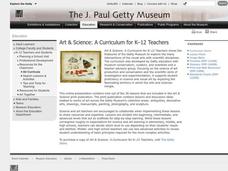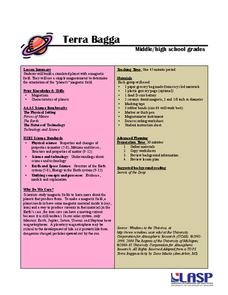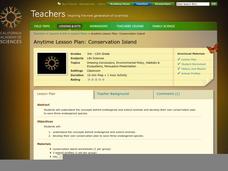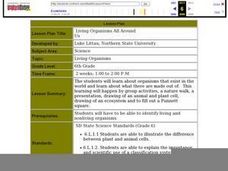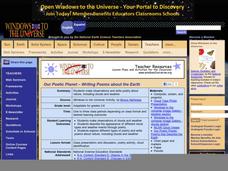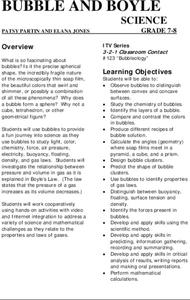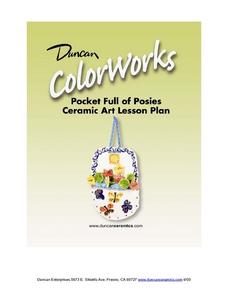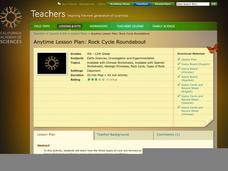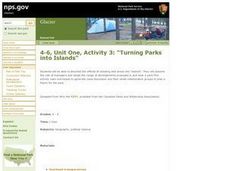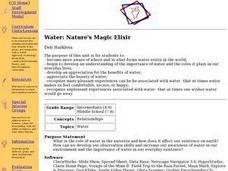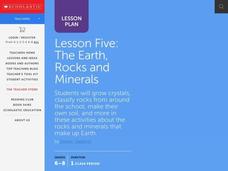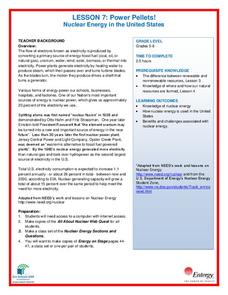Curated OER
The Creation of an Imaginary Species
Students explore the characteristics that distinguish different forms of animal life on Earth which are the results of natural selection and adaptations to their environment. The creatures are created using a game and then drawn by the...
Curated OER
Medieval Natural Resources
Pupils discuss and view examples of the illuminated manuscripts that were created during medieval times and into the Renaissance. In small groups, they research the resources that were used to create the manuscripts and classify them as...
Curated OER
Salt of the Earth: A Caddo Industry in Arkansas
Middle schoolers explore the history of the Caddo Salt Industry found in Arkansas. Along with learning about how salt deposits formed in Arkansas, learners study the process of salt production and how valuable salt is as a natural...
University of Colorado
Terra Bagga
One way to identify possible volcanic activity on other planets is by testing the planet for magnetism. A science lesson begins with pupils constructing their own planet from a dead battery, magnets, paper, and tape before labeling the...
Curated OER
Exploring Biomes Lesson 5: You Need a Vacation
In cooperative groups, emerging ecologists research assigned biomes found in Arizona. Combining photos and facts, they use PowerPoint to produce a fully automated commercial that lasts 45 seconds. In addition to the lesson outline,...
California Academy of Science
Conservation Island
Why not walk in the footsteps of Teddy Roosevelt and become a conservationist? After discussing issues and reasons for animal extinction, the class creates their own conservation plans. Each small group is given mock data regarding a...
Curated OER
Living Organisms All Around Us
Sixth graders study organisms that exist in the world and what they are made up of. They participate in a nature walk, a presentation, a drawing of an animal and plant cell, draw a ecosystem, and fill out a Punnett square.
Curated OER
Solar Kit Lesson #8 - Positioning Solar Panels II: Explorations with Stationary Panels
This lesson is preparation-intensive, but well worth the investment. You will construct five or six portable testing stations with which lab groups will gather data on the best position for collecting sunlight with a solar panel. This is...
Curated OER
Our Poetic Planet - Writing Poems about the Earth
As a way to combine language arts and science, try this lesson on writing cloud poetry. Begin by showing a PowerPoint presentation and images of cloud types. Take meteorology masters outdoors to explore the sky using the provided "Cloud...
Chicago Botanic Garden
Causes and Effects of Climate Change
Wrap-up a unit on global climate change with a lesson that examines the causes and effects of climate change. Learners fill out a chart that represents what they think causes climate change—natural and human-based—and what they think...
Curated OER
Properties of Fresh and Sea Water
Students work with three stations to demonstrate the properties of water. They explore water's boiling point, freezing point, and its ability to store heat.
University of Colorado
Distance = Rate x Time
Every year, the moon moves 3.8 cm farther from Earth. In the 11th part of 22, classes use the distance formula. They determine the distance to the moon based upon given data and then graph Galileo spacecraft data to determine its movement.
Curated OER
Bubble and Boyle
Middle-schoolers still enjoy playing with bubbles! In this series of eight laboratory activities, science learners explore convex and concave surfaces, angles, gas laws, buoyancy, density and more!
Curated OER
Pocket Full of Posies: Ceramics
After studying the plant or flower life cycle, have the class create a basket of flowers out of clay. They hone their ceramics skills while they push, pull, then paint clay to look like flowers they've seen in nature. There are several...
California Academy of Science
Rock Cycle Roundabout
After a basic introduction to the rock cycle and the three main types of rocks, young geologists can deepen their understanding of how rocks change through a fun learning game. Based on the characteristics and events shared by a reader,...
Curated OER
Turning Parks into Islands
Students discuss the effects of isolating areas in a park to make "islands" for nature. In this nature lesson, students role play park rangers who are developing a new section of the park. Students work in groups to plan a park, after...
Curated OER
The Vibrational Nature of Sound
Students explore the vibrational nature of sound. In this science lesson plan, students gain an understanding of sound frequency, pitch, and conduction using the string telephone, tuning fork and musical glasses experiments.
Curated OER
Nature's Magic Elixir
Students do research to discover the importance of water in the world and its effect upon our daily lives. They will also appreciate the beauty of water and how it is so adaptable within nature.
Curated OER
Applied Science - Science and Math Pre - Lab (Scientific Method)
Students examine science. In this scientific method lesson, students are introduced to what every experiment contains (hypothesis, critical thinking) and how an experiment is conducted. They watch a demonstration and then work...
Curated OER
Watershed Landscape
Students demonstrate how water flows by building a human watershed using themselves. In this ecology instructional activity, students compare and contrast point-source and non-point source pollution. They write what they have learned...
Curated OER
Buildings Have Lives, Too: Disasters and Their Effect on People
Students research natural disasters and their lasting effect on both people and the environment. In this environmental science activity, students complete a group project on a natural disaster of their choosing. Students examine multiple...
Tech Museum of Innovation
Seed Dispersal
Engineering challenges are not just man-made ... nature has its own set of them. A hands-on STEM activity has groups designing a seed dispersal system. Each group can only use one sheet of paper — a tough task!
Scholastic
Lesson Five: The Earth, Rocks and Minerals
Apply the principles of geology to a series of collaborative, hands-on class activities. Young earth scientists learn more about igneous, metamorphic, and sedentary rocks before classifying and weathering rocks that they find....
National Wildlife Federation
Power Pellets! Nuclear Energy in the United States
Nuclear power provides about 20 percent of the energy generated in the United States. The seventh activity in the series of 12 tackles nuclear power. After sharing what they know about nuclear energy, scholars complete a WebQuest make a...



